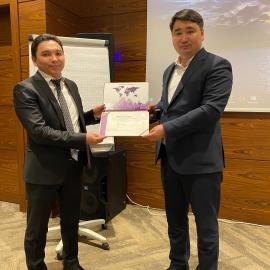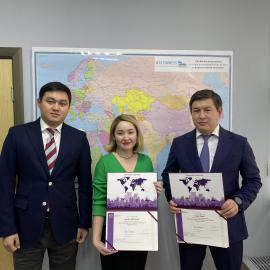f you dream of a career involving efficient logistics system management, optimizing transportation routes, and ensuring smooth supply chains, then the International Diploma in Logistics and Transportation program is your key to success!
The International Diploma in Logistics and Transportation provides opportunities for enhancing your professional qualifications, opening doors to numerous career opportunities, developing skills in effective management and strategy development to improve logistics processes. It validates your expertise and ability to apply advanced methods and technologies in logistics and transportation management.
All training programs are developed by CILT UK, which means you will receive knowledge and credentials according to European standards recognized in 40 countries worldwide..
We will open up the world of global logistics for you!
The introductory module "Language of Logistics and Transport"
Also, for a better understanding of international terminology, we suggest you take the introductory module "Language of Logistics and Transport," which is necessary for proper comprehension of the information. The program duration is 8 academic hours.



This module provides essential knowledge for managers interested in building efficient enterprise operations. The program covers aspects of both internal and external organizational structure, team management, as well as financial and other methodologies necessary for ensuring progressive business development.
The goal of this module is to provide the fundamental principles, concepts, and practices of supply chain management. Through it, participants will learn to forecast, plan, and select the optimal market price considering demand, costs, and other factors. Proper supply chain management methodologies will help you efficiently utilize company resources.
Transport Operations module provides the key aspects of transportation operations, giving professionals in the transportation industry the foundation to understand the principles of efficient and safe movement of goods and people across major modes of transportation in regional and international contexts. The module covers the basics of transportation operations, assessment of demand and supply characteristics, as well as various methods through which cargo can be delivered efficiently and effectively.
The importance of urban transport planning is just beginning to be recognized in our culture. Successful global practices are being studied and implemented in various regions, showing promising results. This is why all logistics sectors are interested in effective transport planning. In the course, participants will learn about the nature and purpose of transport planning, as well as the complex interaction between transport and land use.
The aim of the module is to demonstrate how effective management strategy can lead to a competitive advantage by improving customer service, operational efficiency, and asset utilization. Sections provide information on traditional supply chain management models and discuss the factors underlying strategic decisions.
This module provides fundamental knowledge for the movement of goods in regional and international directions. The selection of method, transport vehicle, and route is an integral part of the module's discussion. It also examines external and internal issues related to infrastructure and the functioning of interchanges along with their supporting information networks.
The modular program is necessary for the proper organization of passenger transportation. It examines the characteristics of all types of movements. Key elements of the content include the effective use of infrastructure and transportation opportunities to ensure uninterrupted transportation and control of transportation networks.
The content of the modular program focuses on production logistics and how production planning fits into the company's supply chain strategy. Sections examine the logistics of production planning in terms of creating value for customers, ensuring sustainable competitive advantage, and minimizing losses.
The goal of the module is to formulate and apply principles and practices of supply chain management in retail. The module is relevant for those working in retail or logistics operators (3PL) serving the retail sector, as well as those interested in the retail sector.
The module covers the role and strategy of procurement processes and sourcing. It examines the integration of procurement and supply management processes into the overall corporate strategy, as well as the use of efficiency indicators and financial controls that contribute to effective and efficient supplier management.
This module covers the technical processes related to transportation planning. The content provides detailed technical knowledge about quantitative processes that form the basis of transportation planning. It includes the development of strategic plans at both the introductory and advanced levels.
This module examines transportation issues and its impact on society. It explores the influence of factors such as demographics, politics, and environmental considerations arising from the development of transportation for both passenger and freight movements.
The module provides fundamental knowledge in warehouse management necessary for logistics and storage managers. Key elements include the operational functioning of the warehouse, its technology and methods, and effective control. The goal of this module is to ensure understanding and competency in warehouse management, which is essential for both commercial and non-commercial organizations.
The aim of the module is to provide participants with the knowledge necessary for planning, implementing, and managing global supplies/material flows from their source to the end user within the overall framework of the supply chain and organizational business strategy. The module discusses complex issues related to identifying and managing risks inherent in international supply chains, as well as how government trade policy/promotion and intergovernmental regulation influence international business practices
The aim of this module is to provide candidates with the knowledge necessary to assess feasibility, develop, plan, implement, conduct, manage, and ultimately evaluate projects carried out in a controlled environment. This module is designed for anyone working in or interested in change management using proven project management methodology aimed at ensuring controlled efficiency and implementing any improvements identified in line with business strategy requirements seeking to make changes, whether at a strategic, operational, or tactical level.
The aim of the module is to cover the fundamental principles, concepts, and practices of material flow planning in the supply chain. The module addresses issues related to demand forecasting for products and then aligning it with corresponding supply. Key issues related to demand level determination are discussed. Aspects of supply planning are examined, emphasizing the need for different strategies for different products. The module also covers the use of inventory to balance flows between demand and supply. It is relevant for anyone involved in supply flow planning.
The aim of this module is to provide candidates with the knowledge required for planning, implementing, and managing a supply chain network through which products are transferred from their source to the end user. The module covers complex issues in determining network requirements for various types of facilities based on cost and service criteria. It also explores options for acquiring other businesses to create 3PL services. The module is relevant for anyone involved in or interested in supply chain network design. The content provides an understanding of broader commercial issues influencing supply chain design.

Criteria for Experts: